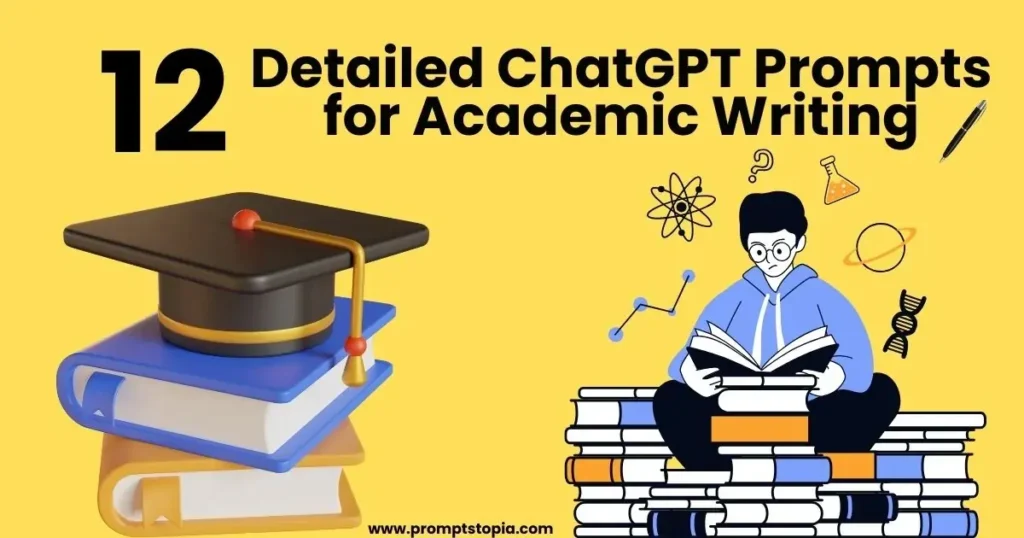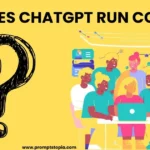What if the hardest thing about writing wasn’t organizing your thoughts but rather figuring out where to begin?
Academic writing is difficult for many professionals and students, not because they lack knowledge but rather because it is hard for them to organize their ideas into well-structured concepts. ChatGPT is useful in this situation. It’s like having a writing companion who helps you get through the most challenging parts of writing.
From a good thesis to breaking down complex concepts into simpler ones or even perfecting a final draft, prompts by ChatGPT can make scattered ideas sound polished. Your work will be of higher quality overall if you use carefully thought-out ChatGPT prompts for academic writing to hone your ideas and strengthen your arguments.
Writing for academic purposes doesn’t have to be so difficult. With the right instructions, ChatGPT can guide you through the process, which will greatly speed up the process.
Why Use ChatGPT for Academic Writing?
Academic writing has a unique set of difficulties. You may spend hours staring at a blank page due to writer’s block. Structuring ideas into a rhythmic flow might feel impossible. And when it comes to rephrasing complex concepts, the frustration can be real.
This is where the difference shows up with the use of ChatGPT prompts for academic writing. They help break the massive task into small, achievable ones, saving precious time and giving clarity to your work.
The adaptability of ChatGPT is what makes it intriguing. A well-written prompt can serve as a guide for you whether you’re writing essays, doing research, or even navigating the challenges of a thesis. This doesn’t limit to just academic work but also the writing of great content in the form of articles, blogs, or marketing copy with its own prompts for content writing.
From brainstorming ideas to organizing thoughts, the same principles can be applied for content writing. It is proof that ChatGPT is an all-around writing tool. So, focus on clear and actionable prompts to do high-quality work efficiently, either in academics or beyond.
Effective Prompts for Academic Writing
Using precise and carefully constructed prompts is essential to getting the most out of ChatGPT for academic writing. Examples of prompts for common academic assignments that guarantee accuracy and clarity are provided below.
Crafting a Stellar Thesis Statement
You are an academic writing expert specializing in developing thesis statements that are both attractive and understandable. Write a thesis on a research paper on [topic]. Make sure it is concise, argumentative, and includes the main point and supporting ideas. Offer three versions, each with a little different focus. Use language that suits academic audiences and maintain clarity and precision.
Structuring a Winning Introduction
You are a professional academic writer skilled in creating engaging introductions. Create an introduction for an essay on [topic]. Start with an engaging opening sentence, provide context about [topic], and make the thesis clearly. The introduction should not exceed 150 words and use language that suits academic audiences.
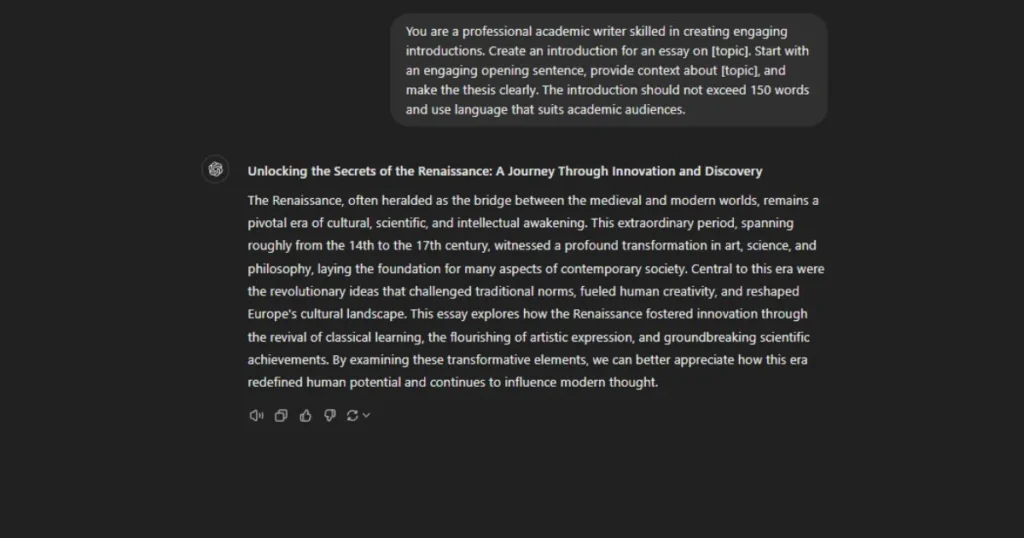
Developing Strong Arguments
You are a writing expert with a focus on critical analysis and academic debate. Create three main arguments to support the claim: ‘[specific claim].’ Each argument should be backed by evidence or proof, include similar examples, and stay logical and clear. Give a one-sentence summary for each argument and provide references from research that might support them.
Simplifying Complex Ideas
You are an academic editor who has the ability to simplify complicated concepts. You need to rewrite the following paragraph for a wide audience without losing its academic quality: ‘[paragraph]. Simplify the language while keeping key ideas, examples, and complex terms where necessary. Make sure the result is still suitable for an audience at the undergraduate level.”
Polishing and Proofreading
You are an expert academic proofreader with expertise in grammar and style. Read the following passage for grammatical errors, uneasy wording, and unclear changes: ‘[insert text].’ Suggest improvements to increase clarity and academic tone. Use track changes and give a brief summary of the changes that were made.
Organizing Research Papers
You are a research paper consultant skilled in academic structuring. You need to outline the structure for a research paper on [topic]. Add sections for introduction, literature review, results, discussion, and conclusion. Provide a detailed description of what each section should cover and offer tips for maintaining logical flow throughout.
Crafting Engaging Conclusions
You are an academic writing expert with a focus on impactful closing statements. Write a conclusion for an essay on [topic]. Summarize the key points, repeat the main idea in a new way, and provide a final thought or call to action that should be extraordinary. Make sure the conclusion stays under 200 words and connects to the opening.
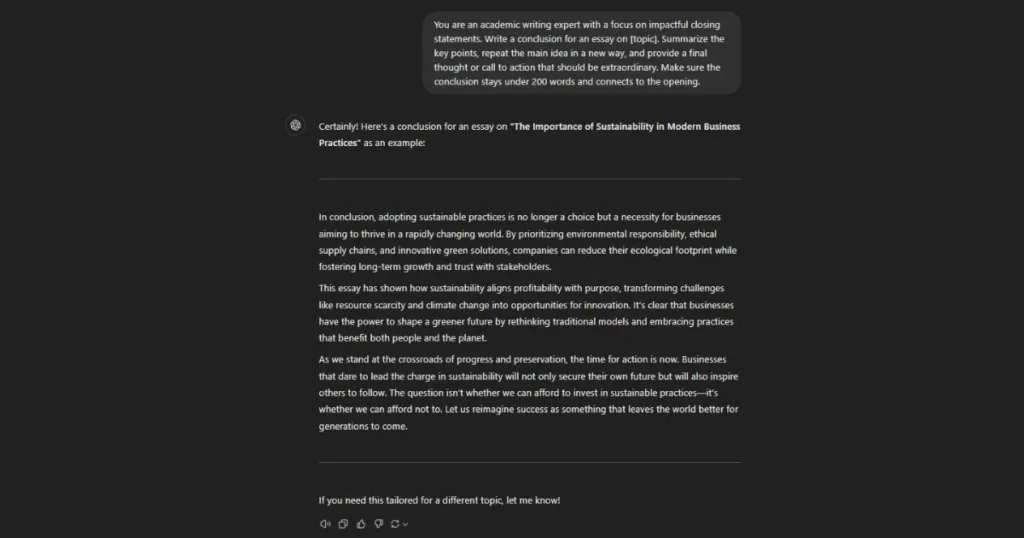
Creating Annotated Bibliographies
You are a skilled academic researcher. You need to generate an annotated bibliography entry for: ‘[insert topic].’ Add a proper reference in [specific format], a 3-4 sentence summary of the source’s main arguments, and an explanation of how it supports the research topic [specific topic].
Formulating Research Questions
You are an academic advisor skilled in research question creation. You need to develop five research questions for a study on [specific topic]. Make sure the questions are clear, focused, and researchable. Add a combination of comparing, logical, and descriptive questions related to the selected academic topic.
Designing Engaging Essay Titles
You are an academic editor known for creating engaging and precise titles. Suggest five unique and appropriate essay titles for the topic: ‘[insert topic].’ Each title should be concise, capture the main idea of the essay, and show its academic tone. Provide a one-sentence explanation for each title choice.
Drafting Literature Reviews
You are an expert literature review specialist. Write a literature review on [topic]. Summarize findings from at least three sources, highlight key points and themes, and identify gaps in the research. Ensure smooth transitions between ideas and maintain an academic tone throughout. Limit the review to 250 words.
Building Persuasive Counterarguments
You are a debate specialist skilled in crafting counterarguments for academic essays. Write a counterargument on: ‘[topic].’ Provide evidence to support the opposing viewpoint and examples, then deny it using reasoned arguments and scientific sources. The counterargument should be concise yet strong enough to challenge the original claim.
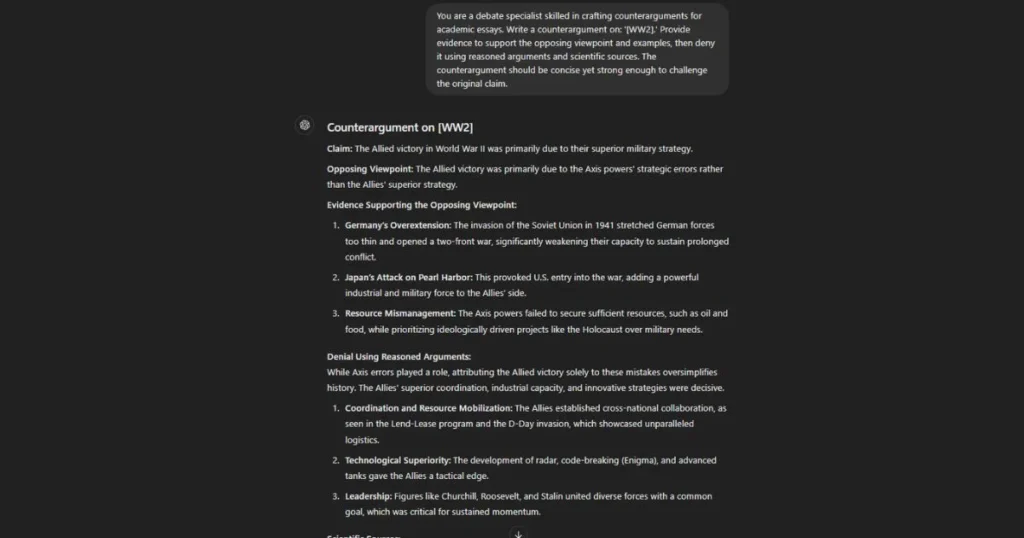
Common Misconceptions About ChatGPT in Academic Writing
Most people get the whole process of how ChatGPT works in writing an academic piece wrong. Some common misconceptions about ChatGPT are explained below.
- Fear of Over-Reliance on AI: ChatGPT is a brainstorming and drafting tool, not a replacement for originality. For example, ChatGPT prompts for writing can guide structure but still require your unique input.
- Originality and critical thinking are vital. Though ChatGPT can help in organizing thoughts or rewording language, the heart of any paper will always be yours. With the help of ChatGPT, you can even write a plagiarism-free essay that is a mixture of your creativity and ChatGPT’s suggestions.
- ChatGPT replaces human creativity: ChatGPT saves time with repetitive tasks like making outlines or clarifying complex ideas, but it cannot replace the value of human creativity and insight.
Making proper use of ChatGPT helps it to act as a beneficial assistant while allowing your academic or creative work to retain its originality.
Conclusion
These ChatGPT prompts for academic writing transform the way that students and working professionals approach writing tasks. Rendering even the most complex tasks more manageable. You would find new ways to streamline the process and enhance your skill level by testing out ChatGPT prompts on your writing.
The key to success is balance; use ChatGPT as a tool to support your creativity, not replace it. You’ll learn how AI may be an effective partner in your academic development with regular practice and a knowledge of ChatGPT best practices. Your understanding of how to use ChatGPT to develop as a writer will improve the more you engage.
Tools like ChatGPT are available to make the adventure of writing less intimidating and more fulfilling.

